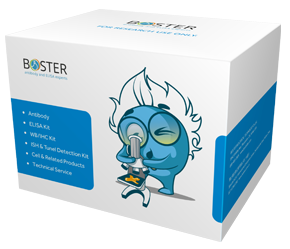Product Info Summary
| SKU: | MA1024 |
|---|---|
| Size: | 100 μg/vial |
| Reactive Species: | Human |
| Host: | Mouse |
| Application: | IHC, WB |
Customers Who Bought This Also Bought
Product info
Product Name
Anti-Cytokeratin Peptide 7 KRT7 Antibody (Monoclonal, LDS-68)
SKU/Catalog Number
MA1024
Size
100 μg/vial
Form
Lyophilized
Description
Boster Bio Anti-Cytokeratin Peptide 7 KRT7 Antibody (Monoclonal, LDS-68) catalog # MA1024. Tested in IHC, WB applications. This antibody reacts with Human.
Storage & Handling
Store at -20˚C for one year from date of receipt. After reconstitution, at 4˚C for one month. It can also be aliquotted and stored frozen at -20˚C for six months. Avoid repeated freeze-thaw cycles.
Cite This Product
Anti-Cytokeratin Peptide 7 KRT7 Antibody (Monoclonal, LDS-68) (Boster Biological Technology, Pleasanton CA, USA, Catalog # MA1024)
Host
Mouse
Contents
Mouse ascites fluid, 1.2% sodium acetate, 2mg BSA, with 0.01mg NaN3 as preservative.
Clonality
Monoclonal
Clone Number
LDS-68
Isotype
Mouse IgG1
Immunogen
Cytoskeletal preparation of the RT4 human bladder carcinoma cell line.
*Blocking peptide can be purchased. Costs vary based on immunogen length. Contact us for pricing.
Cross-reactivity
No cross-reactivity with other proteins
Reactive Species
MA1024 is reactive to KRT7 in Human
Reconstitution
Add 1ml of PBS buffer will yield a concentration of 100ug/ml.
Observed Molecular Weight
37 kDa
Calculated molecular weight
50709 MW
Background of KRT7
KRT7 is a type II keratin of simple nonkeratinizing epithelia. The deduced 489-amino acid protein has a calculated molecular mass of about 54 kD. K7 contains 4 central alpha-helical segments with heptad repeats of hydrophobic residues characteristic of a coiled-coil region. Within this domain, K7 shares 73% homology with epidermal K6B. KRT7 gene contains 9 exons and spans more than 15.6 kb. K7 gene is mapped to chromosome 12. Keratin 7 is expressed in a wide range of epithelial structures in humans.
Antibody Validation
Boster validates all antibodies on WB, IHC, ICC, Immunofluorescence, and ELISA with known positive control and negative samples to ensure specificity and high affinity, including thorough antibody incubations.
Application & Images
Applications
MA1024 is guaranteed for IHC, WB Boster Guarantee
Assay Dilutions Recommendation
The recommendations below provide a starting point for assay optimization. The actual working concentration varies and should be decided by the user.
Immunohistochemistry (Paraffin-embedded Section), 2-4μg/ml, Human, By Heat
Immunohistochemistry (Frozen Section), 2-4μg/ml, Human, -
Western blot, 1-2μg/ml, Human
Validation Images & Assay Conditions

Click image to see more details
Boster Kit Box
Protein Target Info & Infographic
Gene/Protein Information For KRT7 (Source: Uniprot.org, NCBI)
Gene Name
KRT7
Full Name
Keratin, type II cytoskeletal 7
Weight
50709 MW
Superfamily
intermediate filament family
Alternative Names
Keratin, type II cytoskeletal 7;Cytokeratin-7;CK-7;Keratin-7;K7;Type-II keratin Kb7;Krt7 ;Kb7 , Krt2-7 ; KRT7 CK7, K2C7, K7, SCL keratin 7 keratin, type II cytoskeletal 7|CK-7|cytokeratin 7|keratin 7, type II|keratin, 55K type II cytoskeletal|keratin, simple epithelial type I, K7|sarcolectin|type II mesothelial keratin K7|type-II keratin Kb7
*If product is indicated to react with multiple species, protein info is based on the gene entry specified above in "Species".For more info on KRT7, check out the KRT7 Infographic

We have 30,000+ of these available, one for each gene! Check them out.
In this infographic, you will see the following information for KRT7: database IDs, superfamily, protein function, synonyms, molecular weight, chromosomal locations, tissues of expression, subcellular locations, post-translational modifications, and related diseases, research areas & pathways. If you want to see more information included, or would like to contribute to it and be acknowledged, please contact [email protected].
Specific Publications For Anti-Cytokeratin Peptide 7 KRT7 Antibody (Monoclonal, LDS-68) (MA1024)
Hello CJ!
MA1024 has been cited in 3 publications:
*The publications in this section are manually curated by our staff scientists. They may differ from Bioz's machine gathered results. Both are accurate. If you find a publication citing this product but is missing from this list, please let us know we will issue you a thank-you coupon.
EPHB4 Regulates Human Trophoblast Cell Line HTR-8/SVneo Function: Implications for the Role of EPHB4 in Preeclampsia
EPHB4 regulates human trophoblast cell line HTR-8/SVneo function: implications for the role of EPHB4 in preeclampsia
Bu S, Zhang Q, Wang Q, Lai D. Int J Oncol. 2017 Nov;51(5):1405-1414. doi: 10.3892/ijo.2017.4123. Epub 2017 Sep 14. Human amniotic epithelial cells inhibit growth of epithelial ovarian cancer cells via TGF-β1-mediated cell cycle arrest
Recommended Resources
Here are featured tools and databases that you might find useful.
- Boster's Pathways Library
- Protein Databases
- Bioscience Research Protocol Resources
- Data Processing & Analysis Software
- Photo Editing Software
- Scientific Literature Resources
- Research Paper Management Tools
- Molecular Biology Software
- Primer Design Tools
- Bioinformatics Tools
- Phylogenetic Tree Analysis
Customer Reviews
Have you used Anti-Cytokeratin Peptide 7 KRT7 Antibody (Monoclonal, LDS-68)?
Submit a review and receive an Amazon gift card.
- $30 for a review with an image
0 Reviews For Anti-Cytokeratin Peptide 7 KRT7 Antibody (Monoclonal, LDS-68)
Customer Q&As
Have a question?
Find answers in Q&As, reviews.
Can't find your answer?
Submit your question
1 Customer Q&As for Anti-Cytokeratin Peptide 7 KRT7 Antibody (Monoclonal, LDS-68)
Question
We are currently using anti-Cytokeratin Peptide 7 antibody (Monoclonal, LDS-68) MA1024 for human tissue, and we are satisfied with the WB results. The species of reactivity given in the datasheet says human. Is it possible that the antibody can work on horse tissues as well?
Verified Customer
Verified customer
Asked: 2018-05-16
Answer
The anti-Cytokeratin Peptide 7 antibody (Monoclonal, LDS-68) (MA1024) has not been tested for cross reactivity specifically with horse tissues, but there is a good chance of cross reactivity. We have an innovator award program that if you test this antibody and show it works in horse you can get your next antibody for free. Please contact me if I can help you with anything.
Boster Scientific Support
Answered: 2018-05-16




